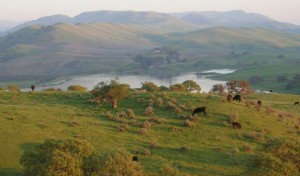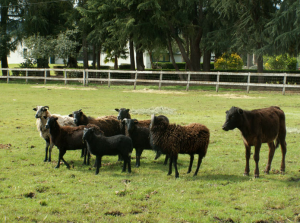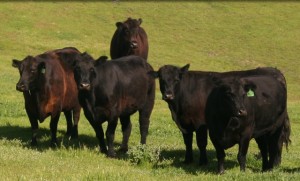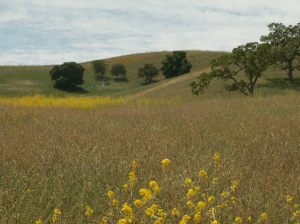 February 10, 2015 – The United Nations has declared 2015 the International Year of Soils, highlighting the importance of soil as an indicator of the health of the planet.
February 10, 2015 – The United Nations has declared 2015 the International Year of Soils, highlighting the importance of soil as an indicator of the health of the planet.
The world is taking note and closer to home—in the fertile and productive farming communities surrounding the Monterey Bay—this sentiment resonates. This year’s EcoFarm Conference in Pacific Grove presented a number of well-schooled voices bearing witness to soil as a key to preserving our future.
With all the buzz, the timing of the upcoming workshop “Restoring Health to Agricultural Ecosystems: Principles and Practices from Soil to Communities” at Paicines Ranch near Hollister could not be better. From March 4-6, the public is invited to dig deep into this issue, hearing from renowned experts in soil sustainability and learning core principles about soil carbon, farming and grazing practices. The goal is to explain how interrelated the health of our soil is to the health of everything living on the planet.
Paicines Ranch is the perfect showcase to host this workshop. A working cattle ranch, with 578 acres of organic cropland, the 7,500 acre historic property was purchased by Sallie Calhoun and Matt Christiano in 2001, and they are dedicated to preserving ecosystems and adhering to sustainable methods.
Kelly Mulville, director of farming at Paicines, was brought on one year ago to plant a brand new 25-acre vineyard. Grenache grapes are being planted on north facing slopes that tend to conserve water more effectively. Mulville has a background in holistic viticulture, beginning with his apprenticeship at UCSC’s Center for Agroecology and Sustainable Food Systems and fueled by his studies with the famous ecologist, Allan Savory.
 Mulville’s unique approach is to implement year-round sheep grazing, even during spring’s bud break, veering away from machine-centric farming. He has found this practice to be successful on other vineyards he has managed, noting an 80% decrease in water use and an increase in yield.
Mulville’s unique approach is to implement year-round sheep grazing, even during spring’s bud break, veering away from machine-centric farming. He has found this practice to be successful on other vineyards he has managed, noting an 80% decrease in water use and an increase in yield.
“Having sheep year round will assist in a larger set up of cycling nutrients and conserving water, a holistic approach for both systems,” he says, explaining that “you can be certified organic but actually not be improving your soil health…that’s the intention of organic practices but the organic standards are almost more a way of guaranteeing a certain level of avoidance of chemicals for the consumer.”
“But for us, that’s just the start of what we are working from. We’ve got that basic level, which is pretty easy to achieve, but then we ask ourselves, ‘what’s going on with our water capacity, our nutrient content, the nutrient quality of the foods from here, and how do we balance that with making a profit?’” he adds.
 Mulville’s keen eye keeps the ranch in line with methods that promote soil health, like having more perennial crops, eliminating tillage, planting grains, cover crops and utilizing animal grazing techniques…all things that veer away from weed-focused, fossil fuel-centric farming systems.
Mulville’s keen eye keeps the ranch in line with methods that promote soil health, like having more perennial crops, eliminating tillage, planting grains, cover crops and utilizing animal grazing techniques…all things that veer away from weed-focused, fossil fuel-centric farming systems.
Day one of the workshop, on March 4th, will focus on the dynamics of soil carbon, soil fertility and the biological, physical and mineral elements that create soil. Water, plant health and restorative agriculture are topics for day two.
Dr. Christine Jones, a ground cover and soils ecologist hailing from Australia, will kick off the first part of the workshop and is more than a big deal. “According to my mother, I have always had an interest in ecology, since before I could even walk,” she says. And since those baby steps on this Earth, her work with farmers, implementing restorative soil and water management practices and promoting biodiversity and productivity has been recognized around the world as highly advanced.
 In her article “Nitrogen: the double-edged sword,” she writes, “The application of high rates of inorganic nitrogen in agricultural systems has had many unintended negative consequences for soil function and environmental health.”
In her article “Nitrogen: the double-edged sword,” she writes, “The application of high rates of inorganic nitrogen in agricultural systems has had many unintended negative consequences for soil function and environmental health.”
“Data from North America’s longest running field experiment on the impacts of farm production methods on soil quality have revealed that high nitrogen inputs deplete soil carbon, impair soil water-holding capacity – and ironically, also deplete soil N.
Taken together, these factors have been implicated as the underlying cause of widespread reports of yield stagnation around the world. The evidence suggests that although nitrogen is essential to plant growth, the application of large amounts of N as inorganic fertiliser is detrimental to soil. And also detrimental to water.
The USDA estimates that the cost of removing nitrate from U.S. drinking water is more than $4.8 billion per year, while nitrogen run-off from farmland is the single largest source of nutrient pollution contributing to the massive ‘dead zone’ in the Gulf of Mexico,” she writes.
To work against these dire statistics, she presents farmers with four main principles behind “Regenerative Agriculture”, a term that offers a new way of seeing the relationship between plants and soil microbes, and teaches ideas such as year-round living cover cropping, “microbial bridges,” ensuring biodiversity and microhabitats and employing rotational livestock grazing.
Dr. Jones will be joined by two respected presenters, rounding out the workshop on the final day with extensive knowledge in the field of farming and livestock. Cover crops, grass-fed diets and reversing greenhouse gases will be the focus, led by Dr. Eric Brennen of the USDA Agricultural Research Service, a horticulturist researching organic vegetable and strawberry production, and Dr. Cyndi Daley, the program director for the Organic Dairy Teaching and Research Facility at Cal State University Chico.
For more more information and to register for either the full workshop or single days, email events@paicinesranch.com or call 831-628-0288.
About the author
Amber Turpin is a freelance food and travel writer based in the Santa Cruz Mountains.
- Amber Turpinhttps://www.ediblemontereybay.com/author/aturpin/
- Amber Turpinhttps://www.ediblemontereybay.com/author/aturpin/
- Amber Turpinhttps://www.ediblemontereybay.com/author/aturpin/
- Amber Turpinhttps://www.ediblemontereybay.com/author/aturpin/


